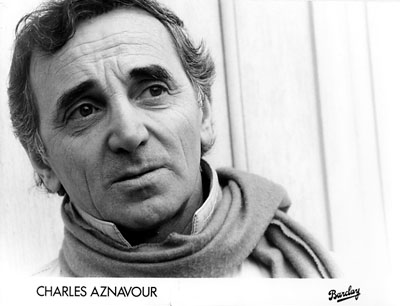The Hamazkayin Armenian Educational and Cultural Society USA Eastern Regional Executive Board mourns the loss of prodigious French Armenian singer, activist, and diplomat Charles Aznavour, and extends its condolences to his loved ones and fans. Aznavour passed away on Oct. 1 at the age of 94, in his home in southeastern France.

The office of French President Macron announced a ceremony will be held on Oct. 5 in the courtyard of Les Invalides, during which Macron will deliver a speech. The Armenian government also announced it will hold a day of mourning that will coincide with his funeral in France. Aznavour was scheduled to accompany Macron to Armenia for the summit of francophone countries on Oct 10 and 11.
One of the most popular singers in France, Aznavour wrote more than 1,200 songs and appeared in more than 60 films, including Francois Truffaut’s film “Shoot the Piano Player” in 1960. Among those who sang his songs are Edith Piaf, Gilbert Bécaud, Léo Ferré, and Yves Montand. Aznavour sang in French, Armenian, English, German, Italian, Spanish, and Yiddish, and sold around 180 million records.
Aznavour became part of Piaf’s entourage, and accompanied her to New York in 1948. Upon his return, he sang in working class cafes in Paris. In the mid 1950’s, his career took off after he appeared in the Moulin Rouge.
Aznavour’s most popular songs include “La Boheme,” “She” (“Tous Les Visages De L’amour”), “Hier encore” (“Yesterday when I was Young”), “Comme Ils Disent” (“What Makes a Man”), “Après l’Amour,” “Tu T’Laisses Aller,” and “Ils Sont Tombes,” which is about the Armenian Genocide.
With a career that spanned eight decades, Aznavour sang about love, loss, loneliness, despair, braking taboos by touching subjects such as depression, prejudice, homosexuality, sex, and rape.
“It’s a kind of sickness I have, talking about things you’re not supposed to talk about. I started with homosexuality and I wanted to break every taboo,” he once told a reporter.
The son of Armenian refugees who fled the genocide, Aznavour was born Shahnour Vaghinag Aznavourian in Paris on May 22, 1924. His father Michael Aznavourian was born in Akhaltske, Javakhk, and his mother Knar Baghdasarian was from Smyrna.
Following the 1988 earthquake in Armenia that killed around 45,000 people, Aznavour organized relief efforts. It was then that he wrote the song “Pour toi Arménie,” together with Georges Garvarentz, which was performed by a group of renowned French artists and topped the charts for more than four months.
In 2004, Aznavour received the title of National Hero of Armenia, the country’s highest award; and in 2008, he was offered Armenian citizenship. In 2009, Aznavour was appointed Armenia’s ambassador to Switzerland. That same year, he received the Grigor Lusavorich award of the Republic of Artsakh. Aznavour was also appointed Armenia’s permanent delegate to the United Nations at Geneva. In Armenia, streets have been named after him, as well as a square; his statue appears in Gyumri, where the earthquake was particularly devastating; and there is even a Charles Aznavour Museum in Yerevan, which was opened in 2011.
In 2017, Aznavour received the Raoul Wallenberg Award from Israeli President Reuven Rivlin, for his family’s efforts to protect Jews and others persecuted by the Nazis during World War II. Thanking the Raoul Wallenberg Foundation, Aznavour took the opportunity to inquire when Israel would recognize the Armenian Genocide.
Following the news of his passing, President Macron stated, “Profoundly French, viscerally attached to his Armenian roots, famous in the entire world, Charles Aznavour accompanied the joys and sorrows of three generations. His masterpieces, his timbre, his unique influence will long survive him.”

No comments yet.